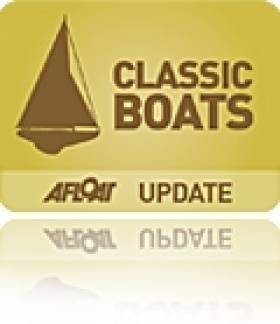Displaying items by tag: Glandore
Early in the 1960s, Sid Smith – a builder and developer from Bury near Manchester – secured the site for the modest holiday home of his dreams beside the harbour in Glandore in West Cork. Summers in Glandore with much sailing for his young son Lawrie, became an essential element in Smith family life, and though Lawrie went on to a stratospheric career in international sailing, whenever possible, he has listed Glandore Harbour Yacht Club as his home base. Thus, in September 2023, thanks to Lawrie, the Dragon Gold Cup – the class’s supreme prize – was added to Glandore’s trophy haul.
It was a particularly timely outcome with the 2024 Gold Cup scheduled for Kinsale. And with autumn rapidly advancing, we are reminded that the Smiths were so fond of Glandore that they were among the families who spent Christmas and New Year there, with Sid Smith’s authentic rendition of Ilkley Moor a midwinter party favourite.
Don Street’s Dragons At Glandore Attract Across All Ages
Glandore in West Cork is a picturesque international melting pot of folk of all types from many backgrounds, and like all melting pots, it can occasionally boil ever, particularly if you have someone like Don Street stirring the heated mix. American-born Don spent much of his 92 years becoming the acknowledged expert on cruising the Caribbean and the practice of traditional self-reliant seamanship, but having had a base in Glandore for decades, even he admits to the slowing effects of advancing age.
So for some time now, his attention has become largely local, and the Glandore axe he has been grinding is the beating of the drum (now there’s a mix of metaphors for your delectation) to celebrate the versatility of the International Dragon (whether plastic fantastic or classic wooden) for club racing and junior training, in addition to contesting hugely challenging international events.
The summertime demographic of Glandore is such that they have sailors of all ages in abundance, and Don reckons the Dragons can readily accommodate them all provided that Glandore Harbour Yacht Club can become a bit more relaxed about the trend towards Committee Boat starts, and rely instead on the convenient starting platform just below the village’s “veranda square”, where all-seeing but thirsty race officers can be sure of a handy pint from one of the excellent pubs.
 Platinum oldies – Don Street at Dragon racing in Glandore. Photo courtesy GHYC
Platinum oldies – Don Street at Dragon racing in Glandore. Photo courtesy GHYC
Don and his mates want races to be easily available at all times and for all ages, and to do that you need to have the starting line which can be put in place with minimum fuss, which is something conspicuously absent when you need to get a fully-crewed safety-compliant committee boat into action
Being firmly of the opinion that there really is nothing more user-friendly than a shore-based starting line with very clearly marked transits, I readily go along with that - as indeed do thousands of people who race at Cowes every year. But whatever your view, there’s no denying that the Dragon class at Glandore is an impressively successful mix of boats and people of all ages, with Don setting the standard, as his youthfully-crewed boat Gypsy is at least 89 years old, which must make him the only owner of an 89-year-old boat who happens to be even older himself………
Glandore Harbour Yacht Club has accused Cork County Council of endangering the future of sailing in the West Cork harbour by changes it plans to make at the village pier.
"This has been drawn up without any consultation whatsoever with Glandore Harbour Yacht Club or with the sailing school. This proposal amounts in reality to a closure order on the sailing school not to mention all the kayakers, motor boaters, rowers etc. who also use the pier," says GHYC. "The proposal could result in a ban of all marine leisure activity from Glandore."
Glandore Harbour pays annually for use of the pier and the club says that its members "personally fund a pontoon for the benefit of the public and all harbour users."
"A GHYC member personally funded an engineering survey and presented it to the Council with drawings and plans to extend the current deck onto waste ground. This would have provided extra storage for all kayaks and many of the dinghies currently on the pier in summer. This cost and effort received no response."
 Glandore in West Cork Photo: Bob Bateman
Glandore in West Cork Photo: Bob Bateman
The club said in a statement that it fears there may be a move by the Council to close the pier completely: "The next step may be to manufacture a report to close the pier completely on safety grounds. This is completely contrary to the County Development Plan for the area."
Cork County Council announced a new 'Management Plan' for Glandore Harbour earlier in April.
"Mariners and general port users are advised that, subject to funding, Cork County Council intends to introduce new safety and pier management measures at Glandore Harbour. This will include New toe rails and handrails; Keep Clear Areas; Designated temporary storage areas for small crafts; Safety signage; CCTV cameras.
"Under the new plan, storage of small crafts will only be permitted in designated areas and access to the breakwater will have to be kept clear at all times."
Tuesday next, May 2, is the closing date for public response to the plan about which the club has protested publicly.
Submissions are to be sent to the Harbour Master’s Office, Skibbereen, P81 RC 21 or by email to [email protected].
This is the second pier in Glandore harbour area which is the subject of a row between the Council and a local community. As Afloat has reported there are local protests at Union Hall, just across from Glandore village over the decision by the Council to close the old pier there to public use.
Glandore Harbour YC says the Council should be using funding from the government for piers to improve facilities not reduce them and should work with the community, not against it, to develop marine recreational facilities.
Don Street of Glandore and the Caribbean celebrated his 90th Birthday in distance-compliant-style with the Glandore Dragons in July 2020. And as he has had his writings about sailing published regularly - both in books and magazines - since 1964, after being encouraged to go for it by no less than Nobel Laureate for Literature John Steinbeck, it is reckoned that he is now the world's senior practitioner of the ink-and-salt-water trade.
But while 2020 brought much pleasure and celebration, it also brought a special sadness, as the Street family lost an old friend. We let Don take up the tale:
"Forty years ago, my Venezuelan friends taught me how to say good-bye to sailing friends who had crossed the harbour bar for the last time on their long voyage to the sailors' Valhalla, where the winds are fair and warm, and the seas moderate.
You walk to the end of the pier with your favourite drink, hoist it as a toast to the departed friend, drink half, then pour the other half into the sea for the departed sailor.
 A time for celebration – all set up for Don Street's 90th birthday race in Glandore on July 25th 2020
A time for celebration – all set up for Don Street's 90th birthday race in Glandore on July 25th 2020
Glandore Harbour is sheltered in all directions except South East, so no one worried to much when a SW gale was predicted the night of October 17th 2020. Unfortunately, the gale must have had a lot of south and a little east of south in it. This created a big surge in the Harbour, and it was a full moon with a big spring tide.
Red Rocket, the Street family's 16' light clinker/lapstrake dinghy that had given 41 years of yeoman service to our family and many others in Glandore, was, along with a number of other boats, swept off the high inner pier wall and destroyed.
Bits and pieces of Red Rocket were spread over the harbour, and during the following days, some of the pieces drifted ashore. With my wife Trich, I decided we'd to give Red Rocket a proper send-off in the fashion with which I always said farewell to those sailing friends who have departed to the maritime Valhalla.
 In her sailing and racing days, the very handy Red Rocket really was painted a bright red. But even when painted with whatever colour happened to be available that year, she gave forty years in all of the unstinting good service
In her sailing and racing days, the very handy Red Rocket really was painted a bright red. But even when painted with whatever colour happened to be available that year, she gave forty years in all of the unstinting good service
The word spread through the village and beyond to as many sailors as possible who'd had a connection to Red Rocket. The plan was to assemble on Glandore pier at 1100 Saturday with their favourite drink in hand and properly say good-bye to Red Rocket while bits and pieces of her were still tossing in the harbour.
Before everyone hoisted their drinks. I told the story of Red Rocket. Many of the assembled sailors knew of parts of the Red Rocket saga, but few knew it all.
In 1979, it was the Golden Jubilee of the Irish Cruising Club, and in July, the Cruising Club of America, the Royal Cruising Club, and Scotland's Clyde Cruising Club assembled with the Irish Cruising Club at the Royal Cork Yacht Club in Crosshaven to begin a Cruise-in-Company westward to Glengarriff, where the ICC had been founded 50 years earlier.
All our cruising focus at the time was on the Caribbean, where our yawl Iolaire was based. But as we'd many friends we'd like to greet in this mixed fleet at Crosshaven, I calculated the tide for the Owenabue river and rented a rather non-descript dinghy from the dinghy rental service in Crosser two hours before high tide, so that with minimal rowing Trich and I could float upon the flood seeing friends on various boats, and then return with equal ease on the ebb, socialising and visiting.
There was a nice-looking clinker 16ft dinghy that I wanted to rent but was unable to do so because one oar was broken. When returning the non-descript dinghy we'd used, I again admired the 16ft dinghy, but the boat hire operator did not share my enthusiasm, as renters claimed it was too tippy. The upshot was he offered to sell the dinghy to me, with oar repaired and delivered to Glandore, for IR£150. I immediately agreed to buy.
 Red Rocket's workaday appearance successfully disguised a real thoroughbred, bought for just IR£150 in 1979
Red Rocket's workaday appearance successfully disguised a real thoroughbred, bought for just IR£150 in 1979
Upon arrival in Glandore, the horrible orange colour was changed to red, the same red as the 46' engineless yawl Iolaire. Iolaire was doing so well racing in the Caribbean that she was known as The Old Red Race Horse.
In the 70s and into the early 80s in West Cork, part of the town festivals that each port ran were rowing races with cash prizes. There were races for various age groups, all men, all women, and mixed. That first year, the dinghy earned more in prize money than I paid for her, but I never saw the money. The kids spent the winnings on chips and soda, the older contestants on booze and beer. By the end of the season, she was known as Red Rocket, a name that has stuck with her even though in her later years, after we'd sold Iolaire, she'd appear in whatever paint was available and latterly had been blue.
The boats that were rowed in the regattas were pretty much whatever could be found and usually quite heavy. So for my daughter, Dory, aged 16, and her friends, I rigged the 16ft Red Rocket to be rowed four-oared. She was the smallest four-oared boat in the circuit, and when the girls first started rowing as a team, Red Rocket looked like a drunken water spider. But they learned to row well and turned in respectable performances against the larger 20 and 22-foot boats.
The following year, Glandore Harbour Rowing Club commissioned Jackie Mons to build a light clinker 20' four-oared boat. In Cu na Mara, the Red Rocket-trained girls were practically unbeatable for three years until the team broke up and gals departed to university and out of Glandore.
In this period, there was little enough local sailing in Glandore except for Kieran, and Dermot O'Donohue match racing their two Dragons, Pan and Fafner. To get sailing, I rigged Red Rocket as a cat ketch, with a loose-footed lug as main, and a mizzen which was also a lug but unique in Glandore, as it was rigged Chesapeake Bay-style with a sprit, rather than a normal boom.
A single lee-board was rigged. It was secured on the lee side by water pressure on the hull, with the top secured to a line that went through a hole in the middle of the centre thwart. The leeboard was switched on every tack to the new lee side, and that was Sean Thompson's job, as he was the biggest and strongest and - at 13 - the oldest member of the crew, with the other two being Donald and Richard Street, aged 11 and 9.
Red Rocket was a great training boat with plenty of strings to pull, and she gained extra kudos among Glandore's growing group of junior sailors, as she was much faster than the expanding fleet of Optimists.
 The 1933-vintage Dragon Gypsy has provided both racing and sail training services to many generations in Glandore
The 1933-vintage Dragon Gypsy has provided both racing and sail training services to many generations in Glandore
But the lure of the Dragons couldn't be resisted, and I bought the 1933-vintage Anker & Jensen-built Gypsy. Red Rocket's sailing rig was discarded, and she became our water taxi for the next thirty-five years. All the crews of Gypsy not only learned to tie knots - many more knots that they learn in the ISA programme – but they also learn to row properly and enjoy it, too, while they kept our carbon footprint at zero as other kids buzzed noisily around with outboards on RIBS.
They learned to pivot Red Rocket in one spot, clock-wise and counter-clockwise, and also how to row in astern to back Red Rocket neatly into the crowded dinghy pontoon in the lee of the Glandore pier, as it is much easier to get in and out of a dinghy via the stern rather than over the bow. I had figured this out over forty years ago, and Iolaire's dinghies were always secured to the dock or float stern rather than bow on.
Sailors who had not previously crewed on Gypsy asked me why Red Rocket had beautiful white fendering all along the port gunwale, but nothing on the starboard side other than a couple of suspended blue fenders. I point out that I like and try to follow old yachting traditions. Owners and guest come on board on the starboard side. Paid hands and tradesmen on the port side….. We always board Gypsy on the starboard side. But alas, we will no longer do it from Red Rocket, and we bid farewell to her in traditional style, our faithful friend of forty years".
 Don Street waxes lyrical – his farewell to Red Rocket in a ceremony at the end of the pier brought the Caribbean to Glandore
Don Street waxes lyrical – his farewell to Red Rocket in a ceremony at the end of the pier brought the Caribbean to Glandore
You might think that in West Cork, which is something of Clinker Punt Central, replacing Red Rocket is proving an easy business as Don accelerates his search, having had his COVID-19 jab last week. But at 16ft overall, she was a slightly unusual length. For although 12 and 14 footers are common, there then seems to be a 4ft leap to the 18-19ft, which is the regular length of the standard Irish lake boat.
As well, though she may look quite heavily built, Red Rocket was surprisingly light, and Don would hope to continue that characteristic. Thus his choices are closely-defined. Perhaps a 16ft version of the edge-glued clinker ply Rankin dinghies of Cork Harbour might fit the bill?
Either way, Don prefers wood, and he likes a bargain, so you see the parameters of this challenge. But if you have or know of an available boat that comes anywhere near the now-legendary Red Rocket's many virtues, please contact Don Street at [email protected]
 A beautifully-restored 14ft Rankin sailing dinghy. Being built with edge-glued clinker ply, they're remarkably light, and a 16ft version of this boat with the same beam but without the centreboard casing might make an ideal replacement for Red Rocket
A beautifully-restored 14ft Rankin sailing dinghy. Being built with edge-glued clinker ply, they're remarkably light, and a 16ft version of this boat with the same beam but without the centreboard casing might make an ideal replacement for Red Rocket
Local Sailing Class Success Takes Good Boats, But Even Better People
As we near the end of the traditional sailing season, inevitably there’ll be heart-searching among boat owners as to the success and value obtained from their summer afloat – can they really justify the expense of continuing to keep a boat? And with so many imponderables in our sport after a summer which was decidedly mixed in its weather - to say the least - the larger sailing community will be scrutinising those classes which seem to be barely hanging in, those classes which are doing quite well, and those few classes which are spectacularly successful. W M Nixon takes a look at the International Dragons in Glandore, the Flying Fifteens in Dun Laoghaire, and the Puppeteer 22s in Howth to try and find that magic Ingredient X which helps - or has helped - these three very different examples to stay ahead of the game.
The wish to own a boat is a vocation, a calling, a quasi-religious emotional endeavour. It’s all very well for high-flown consultants to tell us that if sailing is going to have general appeal and expand, then publicly-accessed freely-available try-a-sail boats will have to be based at every major club. But dedicated sailors know that what comes easy, goes easy. A spell of bad weather, and your jolly public groups who turned up in droves for a bit of free fun afloat will disappear like the will-o’-the-wisps they were in the first place, seeking instead to find somewhere warm and bright and out of the rain and readily providing the latest novel form of entertainment.
Meanwhile, those who are dyed-in-the-wool boat addicts will have barely noticed the idly-interested strangers coming and going. For whatever the weather, they’ve a boat to maintain, gear to repair, a crew to keep together, and some sensible purpose to find in order to give it all deeper meaning. For they know that unless they’ve a boat and her problems and possibilities occupying a significant part of their mind, they’re going to lose the plot completely.
Nevertheless, in the huge spectrum of boat ownership and sailing classes, why is there so much difference in the successful buzz created by some classes at certain localities, as opposed to the dull and declining murmur emanating from classes which are clearly on the way out?
After all, there are very few utterly awful boats afloat. No boat is completely perfect, though some may seem less imperfect than others. But in today’s throwaway world, if some class of boat is not a reasonably good representative of her general type, then she’ll never make the grade in the first place. And even in times past when news and views moved more slowly, the word soon got around if some much-touted type of boat was in truth a woofer.
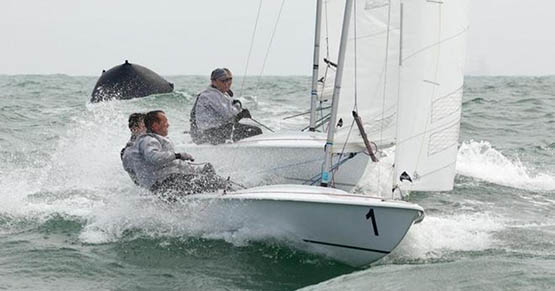
Flying Fifteens provide the best of sport in a very manageable two-man package
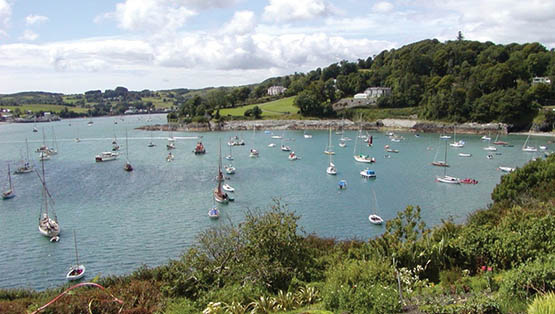
The perfect harbour for vintage International Dragons – Glandore, with a goodly selection of classics in port, and Dragons of all ages dotted among them
That said, boat-owning is such an all-consuming passion that once a sailor has finally (or indeed hastily) committed to a particular boat type, then he or she will tend to be absurdly dismissive of any remotely comparable craft. But in the last analysis, the desire to own a boat is irrational. So we shouldn’t be surprised that once the decision is made, irrational attitudes manifest themselves in every direction.
And anyway, as John Maynard Keynes once remarked in a totally different context, in the last analysis we are all dead. So in the meantime, it behoves us to get as much reasonable enjoyment out of life as possible. Thus if owning and sailing a boat is your way of obtaining pleasure without harming anyone else, then good luck to you and me, and let’s look together at boat classes which are doing the business.
In considering the International Dragons in Glandore, the International Flying Fifteens in Dun Laoghaire, and the emphatically not-international Puppeteer 22s in Howth, we are indeed casting the net wide, for really they couldn’t be more different. The 29ft International Dragon originated in the late 1920s from the design board of Johan Anker of Norway, and she has become a by-word for Scandinavian elegance in yacht design, but today she’s totally a racing machine and has strayed far from her original concept as a weekend cruiser for sheltered waters.
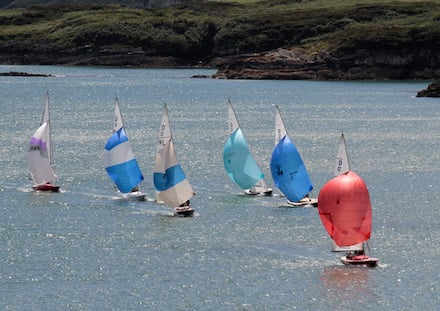
Golden days of classic Dragon racing at Glandore
As for the Flying Fifteen, they originated from designer Uffa Fox having a brainstorm in 1947, in that he took the underwater hull section of the renowned International 14 dinghy in which he was something of a master both as designer and sailor, but above the waterline he drew out the bow to an elegant curved stem, then he lengthened the gentle counter lines to finish in a long sawn-off transom. That done, he added a little hyper-hydrodynamic bulb ballast keel which seemed very trendy, but in truth it’s severely lacking in useful lateral resistance. Nevertheless it gives the boat the reassuring feel of being a small keelboat rather than a big dinghy, and atop it all he put the rig of an International 14 dinghy of that era.
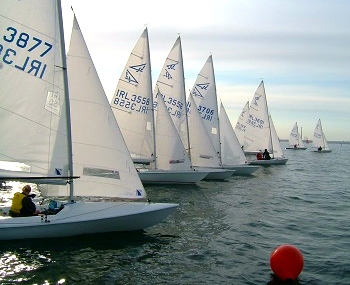
The clean lines of a modern Flying Fifteen fleet. Try to imagine that within each hull there’s an International 14 dinghy, and above it is the original rig
The result was a boat which is really only useful for racing, and it is a design so much of its times that it’s said that many years later the designer himself tried to disown it. But the owners would have nothing to do with this, they liked the compact and very manageable racing-only package which the Flying Fifteen provides, and these days the class has an interesting world spread, and an attractive policy of staging their World Championships at agreeable sunshine destinations where – thanks to their guaranteed ability to turn up with a fleet of viable size – they can arrange block discounts to provide the owners with a very appealing package.
After the sheer internationality of the Dragons and the Flying Fifteens, the Puppeteer 22s are something of a culture shock, as almost every one in existence has ended up based in Howth, where they have such a busy club programme that they only very seldom go south of the Baily, though they do have one annual adventure to Malahide for the Gibney Classic, and once a year they take part in the historic Lambay Race. But otherwise, they’re totally and intensely focused on club racing off Howth.
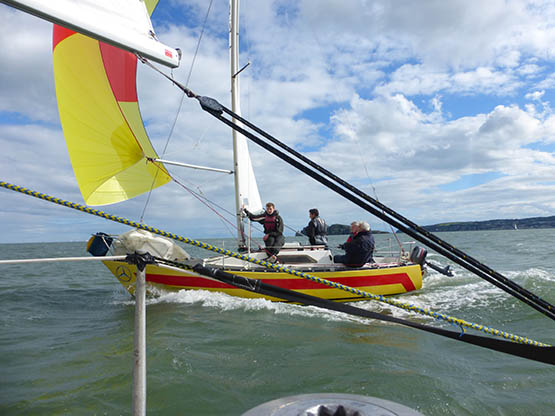
The Puppeteer 22s seldom stray far from their home port of Howth, for at home they get superbly close racing with a fleet of up to 26 boats in evening racing. This is former ISA President Neil Murphy racing hard at the helm of Yellow Peril, neck and neck with Alan Pearson’s Trick or Treat. Photo: W M Nixon
They were designed by Chris Boyd of Strangford Lough in the mid 1970s to be fractionally-rigged mini-offshore racers, and in all about thirty-three of the Puppeteer 22s were built by C & S Boyd in Killyleagh (Sarah was Chris’s wife). For a while it looked as though they might take off as a semi-offshore One Design class in the north, but somehow they began to trickle down to Howth. They appealed to those sailors who felt that the alternative of a Ruffian 23 with her huge masthead spinnaker was a little too demanding on crews, whereas the Puppeteer’s fractional rig is fairly easily managed. And today the class in Howth is in such good health that even in the poor weather of 2015 they were obtaining regular midweek evening racing best turnouts of up to 26 boats.
Obviously the Puppeteer 22s are now very much a completely localised phenomenom. But while the Flying Fifteens in Dun Laoghaire and the Dragons in Glandore may be representatives of well-established international classes, the fact is in both cases their neighbourhood success is largely due to a distinct local flavour driven by individual enthusiasm. And in Glandore while it’s recognized that the vintage Dragon class was started by Kieran and Don O’Donohue with the classics Pan and Fafner, the man who beats the drum these days for the racing at Glandore as providing “the best and cheapest Dragon racing in the world” is the inimitable Don Street.
Most people will expect that they will be slightly older than the boats they own, and the older you get the greater you’d expect the age gap to be. But Don’s classic Dragon Gypsy is 82 years old. Yet Don himself manages to be that proper little bit senior to her, as he’s 85 and still full of whatever and vinegar, as they’d say in his native New England.
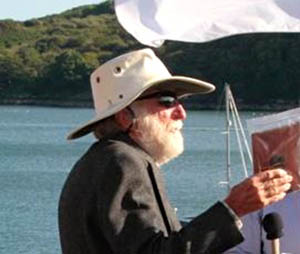
The one and only Don Street in his beloved Glandore. His International Dragon Gypsy is 82 years old, but he still manages to be the senior partner at 85.
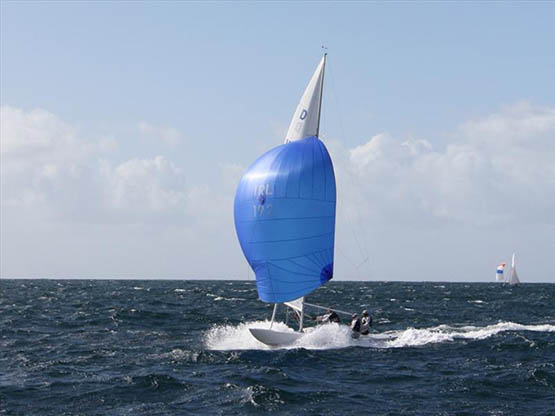
Conditions are pleasantly sheltered for the Dragons in Glandore Harbour, but when the fleet goes offshore – as seen here for last year’s championship - they can find all the breeze and lively sea they might want, and more.
The things that Don has done with Gypsy – between intervals of the renowned ocean voyaging with his 1905-built yawl Iolaire which he has now sold – are remarkable, as he sailed Gypsy from Glandore to the classic regatta in Brittany, which is a prodigious offshore passage for an open cockpit racing boat along what the rest of the world would see as significant portions of the most exposed parts of the Fastnet Race course.
Yet although he did such wonderful business with Gypsy on great waters, he has no doubt that the secret of Glandore Dragon racing’s local success is the sheer nearness and convenience of it all. “Down to the pier and out to the boat in five minutes, the starting line is right there, and we don’t race those boring windward-leewards, rather we use club buoys, government navigation marks, islands - and lots of rocks……”
His argument is that with lovely Glandore Harbour being such an fascinating piece of sailing water, part of the interest in keeping up the pace in a local class lies in using those local features, rather than pretending they simply don’t exist by setting courses clear of the land. But of course when the Glandore fleet – which continues as a mix of classic wooden and glassfibre boats – hosts a major event such as last year’s Nationals – which was won by Andrew Craig of Dun Laoghaire in Chimaera – then the courses are set in open water, and they’d some spectacular sailing with it.
In many ways Glandore is a special case, as the population swells in summer with people coming for extended vacations. When that’s the case, their commitment to local Dragon racing can be total, and not least of the occasional local summertime alumni is the great Lawrie Smith. He may have won the Dragon Gold Cup from a fleet of 66 boats last month in Germany under the burgee of another club, but when he’s racing Dragons in Ireland, he’s emphatically under the colours of Glandore Harbour Yacht Club.
Despite these glamorous international links, it’s the folk on the home ground with their dedication to the Dragon Class in Glandore who keep it all going, and it’s Don Street with his dogged determination to prove you can run a Dragon out of pocket money, regardless of the megabucks some might be ready to splash out, which gives the Glandore Dragons that extra something. And in the end it’s all about people, and shared enthusiasm. If you’ve a warm feeling about the Dragon class, and particularly for classic boats in it, then you know that in Glandore you’ll find fellow enthusiasts and every encouragement.
But up in Dun Laoghaire, if you take a look over the granite wall on to the east boat park at the National Yacht Club in summer, and see there the serried ranks of apparently totally identical Flying Fifteens all neatly lined up on their trailers, you could be forgiven for thinking it’s all just ever so slightly clinical, and certainly distinctly impersonal.
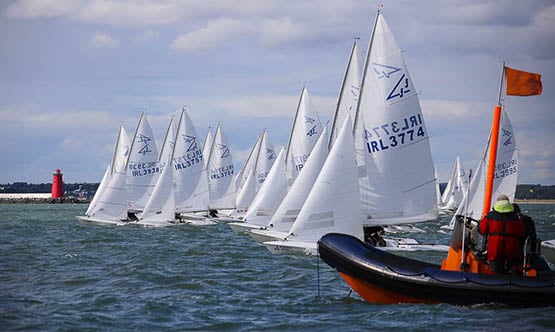
Just about as one design as they could be – the fine fleet at last weekend’s Flying Fifteen Irish Championship in Dublin Bay showed the vigour of the class, which has 47 ranked helmsmen in this country.
Yet you couldn’t be more utterly wrong. Today’s Flying Fifteens may have been technically refined to the ultimate degree to give maximum sport for the minimum of hassle. But their current runaway success – they’re far and away the biggest keelboat One Design class in Dublin Bay – is down to a friendly and very active local class association, and its readiness to reach out the hand of friendship and encouragement to anyone who might be thinking of joining the class’s ranks.
Recently the pace has been set by class captain Ronan Beirne, who recognises that simply announcing and advertising an event is not enough. You have to chivvy people and encourage them into their sailing – particularly after a summer remembered as having had bad weather – and then far from sitting back and smugly counting numbers, you have to keep at it, seeing that crewing gaps are filled, and that those on the fringes are brought to the centre.
The Flying Fifteens – which are essentially a National YC class – offer exceptional value and a very manageable package. The boats are dry-sailed in their road trailers, and instead of queuing for a crane, they have a rapid rota of slip-launching, with the expectation of renewing the wheel bearings each year. Salt water and road trailers are not good partners, but in order to ensure the most efficient launching and retrieval of the boats after each day’s racing, replacing wheel bearings has become something of an art.
The class in Dun Laoghaire secured good sponsorship from Mitsubishi Motors at the beginning of the year, and the sponsors in turn have been rewarded by a thriving class in which inter-personal friendships have developed to such a healthy state that you might find people crewing for someone who would be a complete and untouchable rival at other times in many other classes, but in the Dun Laoghaire Flying Fifteens he’s a fellow enthusiast who happens to be short of a crew on that day.
One of the enthusiastic newcomers to the class this year is Brian O’Neill, who originally hailed from Malahide and was best known for campaigning the family’s Impala 28 Wild Mustard with great success for several years, but now he’s very much a family man living in Dun Laoghaire with three growing kids, and sailing had gone on to the back burner.
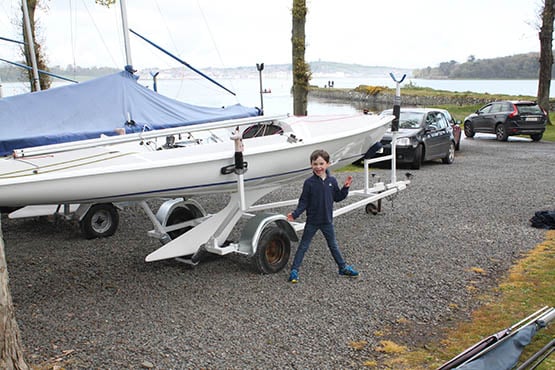
Charlie O’Neill (aged 7) at Strangford SC with dad Brian’s newly acquired Flying Fifteen. Under the rapid moving launching system at the National YC, the dry-sailed Flying Fifteens use their road trailers to get the boats afloat in record time. The need for regular replacement of the wheel bearings is allowed for in each boat’s budget. Photo: Brian O’Neill
But as the National YC is just down the road from where he lives, he was drawn into its welcoming ambience, and soon became aware of the attractive and friendly package offered within the club by the Flying Fifteens. He bought one in good order from an owner at Strangford Sailing Club in the Spring, and was soon in the midst of it. Yet it takes up only a very manageable amount of his time, it simply couldn’t be more convenient, and the people are just great too.
Who knows, but having won the class’s last evening race of the 2015 season, he might even be prepared to travel to maybe one event at another venue in Ireland. But the primary attraction continues to be the class’s strong local ethos and ready racing at the National, the friendliness of fellow Flying Fifteen sailors, and the sheer manageability of the whole thing – this is not a boat where the ownership gets on top of you.
If you want to get the flavour of Dun Laoghaire Flying Fifteen racing, you get a heightened sense of it from the report in Afloat.ie of how David Gorman and Chris Doorly won last weekend’s Irish championship in classic style, and if this isn’t good value in sailing and personal boat ownership, then I don’t know what is.
Across Dublin Bay in those misty waters of Fingal beyond the Baily, your correspondent found himself reporting aboard Alan “Algy” Pearson’s Puppeteer 22 Trick or Treat last Saturday for the opening race of the MSL Park Motors Autumn League. I did so with some trepidation, for Alan has a super young crew recruited from Sutton Dinghy Club in the form of GP14 ace Alan Blay, Ryan Sinnott and Claud Mollard, but our cheerful skipper said that as the day was brisk, they needed the fifth on board for ballast.
In fact, I’d only once raced a Puppeteer before, in the lightest of winds when somehow we managed a win. But as this race progressed with the skipper and his young tacticians making a perfect call for the long beat in a good long course which made full use of the splendid sailing waters north of Howth, by the last leg after many place changes it looked as though another win might be on the cards.
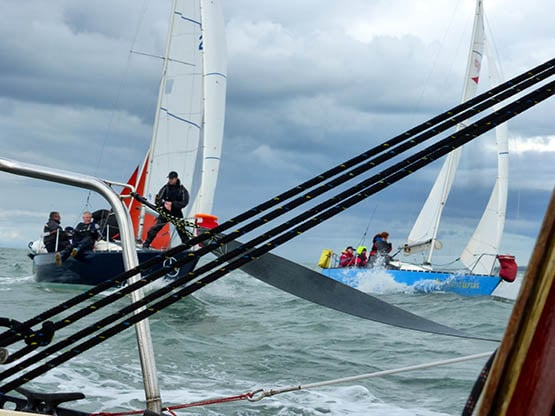
Action stations. Puppeteer 22s closing in for their start. Photo: W M Nixon
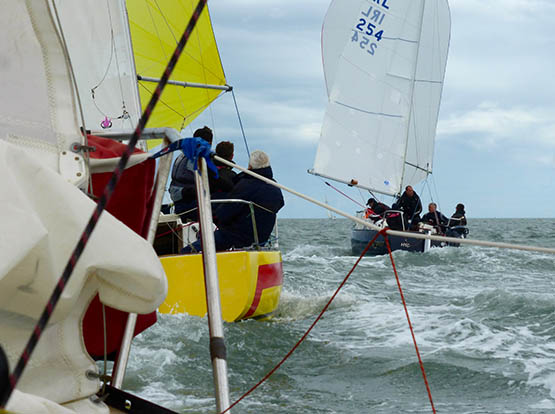
At mid-race, Gold Dust led narrowly from Yellow Peril, but by the start of the last beat, Trick or Treat was leading from Gold Dust with Yellow Peril third. Photo: W M Nixon
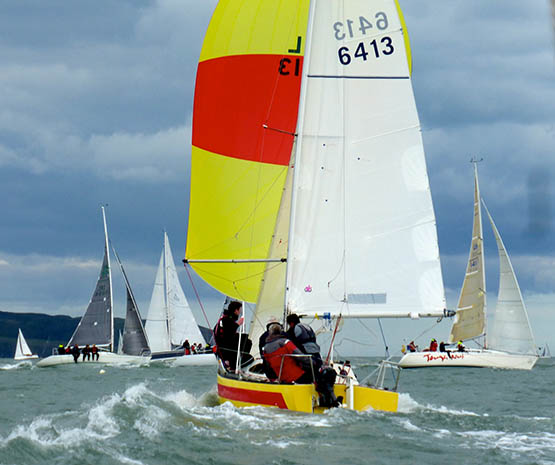
In the MSL Park Motors Autumn League, the mix of classes can sometimes make for interesting situations. Having out-gybed Gold Dust, Yellow Peril is ploughing towards some biggies on another course altogether, and meanwhile there’s the inevitable lobster pot lurking on the way with just one tiny white marker buoy. Photo: W M Nixon
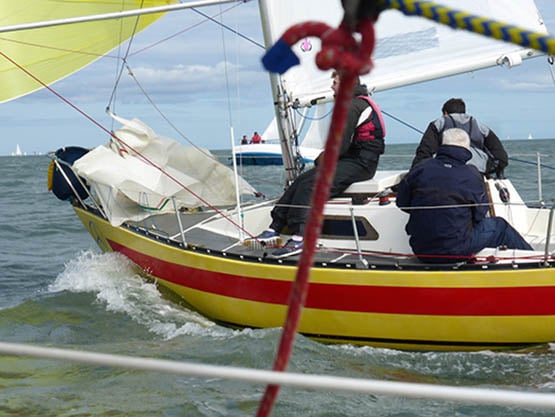
Algy Pearson’s Trick or Treat giving Yellow Peril a hard time to snatch the lead, which she then increased with a cleverly-read long beat. Photo: W M Nixon
But the pace in the Puppeteers is ferocious, and though we’d got a bit of a gap between Trick and former IDRA 14 empress Scorie Walls in Gold Dust, one sneeze from us and Gold Dust would pounce, and alas - we sneezed.
As long as we were carrying the no 2 headsail (what I’d call the working jib) we were level pegging with the formidable Walls-Browne team. But Gold Dust has a lovely new suit of sails (nice ones, Prof), and when the easing wind meant we’d to change up to the genoa, it emerged as a sail of a certain age, and having it set sapped our confidence.
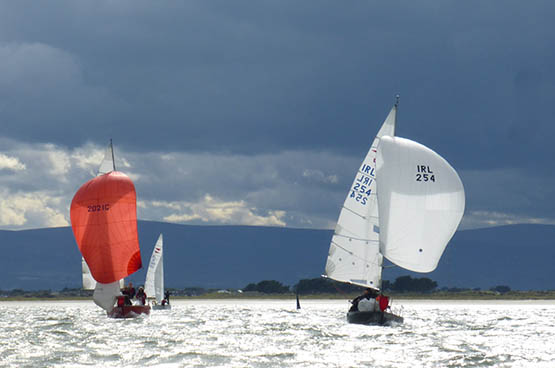
It looked for a while as though Gold Dust (254) had been put fairly comfortably astern……..Photo: W M Nixon
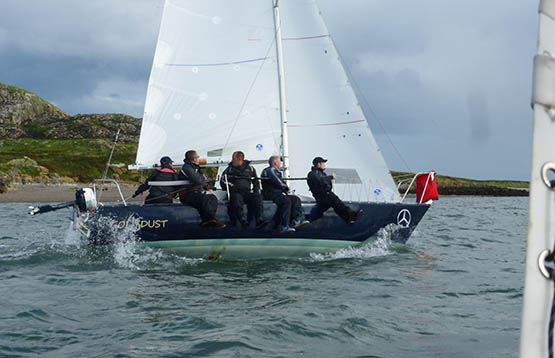
……but an easing of the wind saw Gold Dust finding new speed, and with perfect tactics she was right there with just a hundred metres to go to the finish. Photo: W M Nixon
Until then, the boat had been sailed magnificently, tactics right, trim right, and throwing gybes with such style that the downwind pace never missed a beat. But trying to get that genoa right was a mild distraction, so when Scorie the Queen of the Nile came round the final mark to chase us up the last beat to weather Ireland’s Eye, we’d failed to throw a precautionary tack to keep a loose cover, and suddenly as she rounded she found a local favourable but brief shift of 15 to 20 degrees, and then it was all to play for.
Dissecting it all afterwards (you’ll gather it was a post mortem), we could see two places where we might have still saved the day, but we didn’t grab them, or maybe in truth they were beyond our reach. Whatever, Gold Dust was in the groove and we weren’t. Madam beat us by three seconds. But the banter afterwards and the evidence that Puppeteer people – owners and crews alike – move happily among boats to keep turnout numbers up, was ample proof that here was another truly community based class which perfectly meets a strong local need.
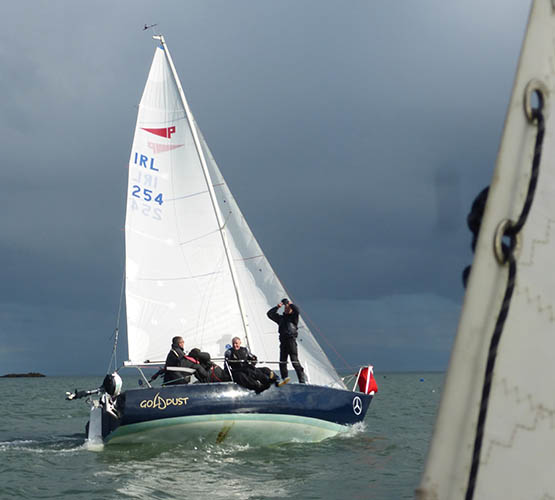
That winning feeling…..Gold Dust’s crew relax after taking first by three seconds. Photo: W M Nixon
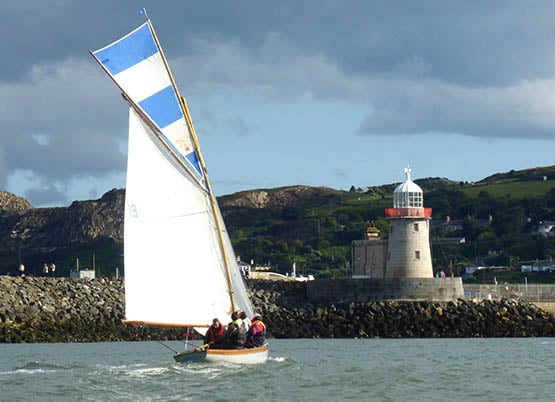
The Howth experience. Howth YC Commodore Brian Turvey heads back to port after racing the MSL Autumn League with the Howth 17 Isobel which he co-owns with his brother Conor. Photo: W M Nixon
It had been a great day’s sport, and the Puppeteers being of an age and regularly turning out to race together, they run both a scratch and a handicap system, which is a great improver of local classes – after all, where would golf be without handicaps?
It shows how well Gold Dust has been going this year that her rating is such that we beat her on handicap by one minute and 19 seconds, but we in turn, having been second on scratch, were fourth on handicap, where the winner was the O’Reilly/McDyer team with Geppeto.
Forty years after they first appeared, the Puppeteer 22s are giving better sport than ever, but in a very local context rather than on the bigger stage that might have been anticipated. Yet for their current owners, they do the business and then some. For most folk, this is sailing as it should be. And as to this longterm success of classes which continue to thrive whether they come from a local, national or international background, certainly the quality of the boats is important to some extent. But mostly, it’s the people involved, and their realization that you’ll only get as much out of sailing as you put into it.
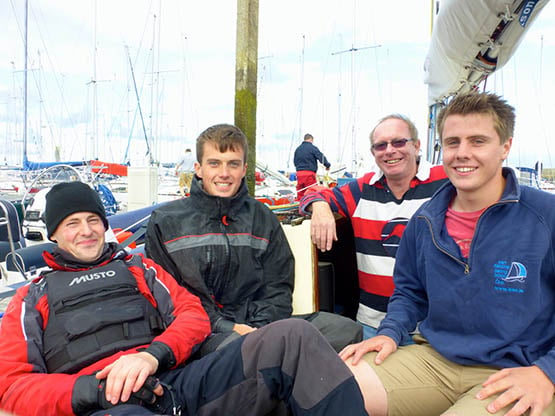
A super crew. Aboard Trick or Treat after racing are (left to right) Alan Blay, Ryan Sinnott, Alan Pearson and Claud Mollard. Photo: W M Nixon
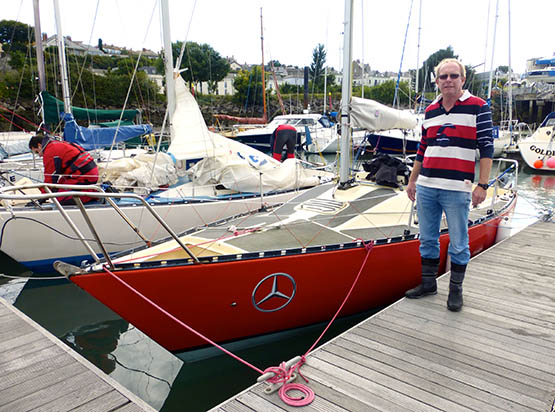
Local man, local boat. Algy Pearson with his Puppeteer 22 Trick or Treat. The Pearsons have been sailng from Howth for three generations. Photo: W M Nixon
Sailing the Enduring Dragon Keelboat on Irish Waters
#dragonsailing –After a weekend of intense Dragon keelboat action on Dublin Bay, Class Captain Conor Grimley writes that after eight decades in the making, the Dragon class is breathing new fire into the Irish sailing scene – and it’s much more accessible than it appears
The Dragon class has never been so strong in international waters as it is today. At over 80 years old, the classic design has endured – and its popularity has ensured that build quality is second to none.
True enough, the class has been somewhat elusive on the domestic scene, with international competitions tending to take precedence over regional events and club racing.
Still, the Irish Dragon fleet has a strong core spread between Dublin Bay, Kinsale and Glandore, where Corinthian sailors mix it with professionals, providing for exciting racing.
Into the bargain is the fact that newer boats don't have it all their own way, such is the quality of older models. And now momentum is coming back to the domestic scene as well.
Take the eighth and final race of the 2014 season at Kinsale, where Lawrie Smith, the Whitbread Round the World legend and current Irish champion, pipped the all-amateur Dublin Bay crew of Phantom – a 10-year-old boat – in a virtual photo-finish. You can't get better than that for club sport.
Sleek design
There are few better sights in yacht racing than the sleek lines of a fleet of Dragons, with their beautiful hull shape and timeless sail plan.
To sail one is just as great a pleasure. Surprisingly responsive at the helm, the Dragon moves beautifully upwind and downwind in all conditions. If a little over-canvassed in heavier conditions, simply drop the main sheet down the track, crank on more running backstay, and you'll find its performance is very reassuring indeed.
Crew weight is a consideration, but it's not the whole story – and over time Dragon sailors develop a strong body core. Sail trim is aided by fine-tuning on the main and genoa sheets.
Contemporary designs are brilliantly thought-out overall, with modern-specification rigging systems that are second to none.
Running costs
Appropriately enough, the basic running cost of the Dragon sits midway between that of dinghy keelboats and cruiser-class yachts.
At eight metres, it is bigger than the average six-meter dinghy keelboat but a tad smaller than the nine-meter cruisers. The Dragon is dry-sailed, and club parking, like marina berths, tends to be priced on a per-metre basis, so size really counts here.
A new suit of sails for the average Dragon costs up to €5,500 for genoa, spinnaker and main. The difference? That’s about 30 per cent up from the keelboat dinghy, but 30 per cent less than what you’d pay for cruiser racer sails. Again, there’s nothing unfair in any of that. In fact, these figures may come as something of a surprise. Dragon sailors, however, bemoan the common observation that it’s a beautiful boat but unduly expensive.
Outlay
So where’s the catch? Well, a new Dragon, complete with its wonderful German-made trailer, will set the buyer back a cool £82,500 but like any boat there is great value to be had in the second–hand market where a race ready competitive boat could be found for as little €18000.
So yes, a brand new Dragon is not a giveaway, but endure they most certainly do. The level of build quality is truly a testament to the strong professional interest globally that’s driven innovation in the class, particularly over the past 10 to 15 years.
The future
Corinthian sailor Tim Pearson of the Royal St George Yacht Club takes over as international class secretary in 2015, a measure of the esteem in which the Irish fleet is held.
He takes up his role at a time when the class is having much debate about the balance between the amateur side and the professional, where there is no shortage of worldwide participation.
Both sides are expected to mix it up in the busy 2015 season that awaits. Moreover, the endorsement of Kinsale for the 2019 Gold Cup raises the incentive for one of the international fleet's great events to return to Irish waters.
“Another challenge everywhere,” says Pearson, “is to encourage more owners in the 37-year-old age bracket.”
Undoubtedly, changing lifestyles and a proliferation of yacht designs are challenges in themselves to all yacht racing, the Dragon included. But the issue of cost may be particularly misrepresented for this class.
Peter Bowring, co-owner of Phantom, concurs. “The Dragon fleet has possibilities for all comers,” he says. “We just have to fly the ‘D’.”
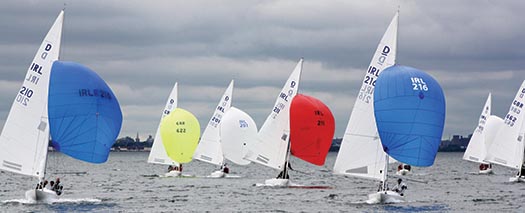
Close competition during the 2015 Dragon East Coasts – Photo: Michael Keogh
Irish Dragon fleets
Dublin Bay: The Dublin Bay Dragon fleet had 15 active boats in 2014. Not all boats opt to register for club sailing, although the National Championships in Dublin and the Dun Laoghaire Regatta looks set to change that in 2015.
Kinsale: The Kinsale Dragon fleet has a long-standing tradition of competition, and the popularity of the Cork town saw an influx of Abersoch-based Dragons for the 2014 Irish Nationals. In 2012, Kinsale hosted the prestigious Dragon Gold Cup, and the success of that event looks set to win the endorsement of the International Dragon Association for the 2019 event.
Glandore: The Dragon and Glandore are a long-standing family tradition. The fleet celebrates its Corinthian legacy, and the annual Rose Bowl Trophy is often an all-Cork affair between the Kinsale and Glandore fleets. Before the establishment of the Glandore Harbour Yacht Club, the South Coast Championships, which moves by rotation with Kinsale, was hosted by the local hotel.
DRAGON KEELBOAT SPECIFICATIONS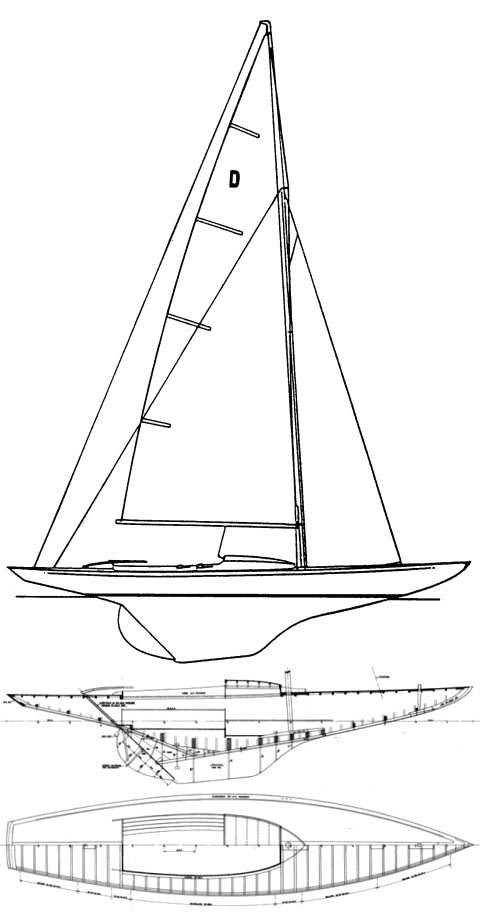
Hull Type: Fin Keel
Rig Type: Fractional Sloop
LOA: 29.17' / 8.89m
LWL:19.00' / 5.79m
Beam: 6.42' / 1.96m
Listed Sail Area: 286 ft2 / 26.57 m2
Draft (max.) 3.92' / 1.19m
Disp. 3740 lbs./ 1696 kgs.
Ballast: 2200 lbs. / 998 kgs.
Designer: Johann Anker
Construction: Wood or FG
First Built: 1928
This article also appears in Summer Afloat magazine 2015
Glandore Launches CH Marine Classic Boat Regatta
#glandoreclassicregatta – The 12th CH Marine Glandore Classic Regatta was launched on Wednesday at the Kiln Bar in Murphy Brewery in Cork. An enthusiastic crowd of classic boat followers attended the launch of the biennial event which takes place from 18th–24th July 2015.
There will be a Parade of Sail on the Sunday of the Regatta plus competitive racing during the week. The very popular "Music in the Street" gig also takes place on Sunday evening. Bill Sandberg (USA) returns as our Principal Race Officer in 2015. The Baltimore/Fastnet cruise and Castletownshend race will take place during the week of the Regatta. This year there will be a special welcome for gaff rigged boats with members of the Old Gaffers Association attending Glandore Classic Regatta as part of their cruise along the West Cork coast.
Jim Cashman of Heineken welcomed the Commodore and Classic committee members, sponsors and invited guests present.
Following this introduction Nick Bendon of CH Marine spoke of his company's involvement in the regatta in recent years and remarked how after a very quiet season in Glandore last year this year already the village is buzzing and business is definitely on the UP. With the re-opened Glandore Inn and the newly opened Glandore Bistro at the Pier House, as well as Hayes' and Casey's bar exceptionally busy over the recent Easter weekend and May Holiday. Nick looks forward to a very successful CH Marine Glandore Classic Regatta next July.
Sean Walsh, the Commodore of the Old Gaffers Association then addressed the gathering and told us about the Old Gaffers Association, a world wide group with members drawn from lovers of gaff rigged boats from all over the world, though mostly from UK, Ireland and France. Sean told us that this year the Old Gaffers were having their Big Cruise on the South Coast and were making a bee line for the Glandore Classic Regatta as part of their Cruise which will then being them as far west as the Fastnet and Skellig Michael. Sean also reminded us that since he first visited the Classic Regatta in 1992 he has returned each time to the warmest of welcomes at the Club and in Glandore Harbour generally. The Commodore John Dowling closed with a review of some of the boats that are planning to be in Glandore for the Regatta next July, a number are regular visitors, there are a a few which have been in re build right through last winter, and also a number that were re launched for the first time during last season. We look forward to welcome back the Cork One Designs and the Anglsea Fifes, as well as the Ettes of Castletownshend to name just a few.
The Glandore Classic Regatta runs from Saturday July 18th to Friday July 24th, The Regatta opening ceremony takes place on Saturday evening July 18th, The parade of sail occurs on Sunday afternoon July 19th. There is a sailing and racing programme of activities daily until Friday 24th when the regatta closes with the final prize giving. Throughout the week there is a full schedule of events including recitals, lectures, quiz, BBQ,street music etc.
Glandore Harbour & The Importance of Safety at Sea
#glandoreharbour – I have had good times, as well as tough and challenging sailing and one frightening experience in the harbour of the oaks or the harbour of gold. Those descriptions, some locals claim, are literal meanings of the name, Glandore, one of my favourite boating spots on the West Cork coastline.
I was there one August Sunday night many years ago when a gale that was not forecast whipped in from the South. Glandore can be a difficult place in strong Southerlies. Met Eireann had forecast a lovely Bank Holiday Weekend that year, but they were completely wrong and later admitted it. We spent a tough night in the Sadler 25 I had at the time. Our anchor pulled out, our inflatable protected us from dragging onto the boat behind and we got the engine started, then spent an hour or two motoring against the gale to keep ourselves clear of the mayhem which was developing elsewhere in the harbour as holiday-making sailors found themselves in the worst of conditions. Tossed around in the heavy winds and pounding waves, we got ourselves across to the westerly side of the harbour and went to anchor in a more passive location off Union Hall until the wind force spent itself, which didn't happen for several hours..
For a while, it was frightening.
That night came to my memory a few weeks back walking along the pier at Glandore on a bright afternoon, when I stopped to look at a plaque recessed into the wall, which is easy to pass by without taking too much notice. That would happen, particularly when the inner harbour enclosed by the pier, is busy.
There is another plaque, partnering the one at Glandore in the village of Leap, a few miles away from Glandore, on the main Cork-Skibbereen road. The plaque is at the Quay Cross in the village and recalls when a party of people travelled from Leap onto Glandore, heading for a day's sail to Baltimore, to the west of Glandore.
Some of them never travelled that way again when they died in the tragedy of the 44ft. fishing lugger, the Zenith.
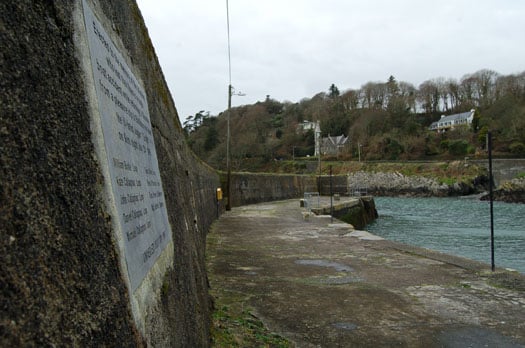
Glandore Pier and the plaque on the wall marking the loss of the Zenith in 1895
The Glandore plaque lists the names of those who had travelled that roadway in high spirits, looking forward to a summer sea trip around the coast. Baltimore could be more pleasantly reached in the year 1895 by water than by road.
In those days it was regular enough on the West Cork coastline to travel by boat from one coastal village to another for a few hours of relaxation during the summer. Roads were not good. Travel by water in the calm weather of July 1895, on a flat sea, would be more pleasant than the sixteen miles by road. Such a trip, "an excursion" was a change from daily working life and was eagerly looked forward to.
It was about nine o'clock on the Sunday summer's night, July 28, 1895 when the group which had sailed from Glandore earlier in the day to Baltimore for their outing boarded the Zenith for the return journey and they were in good form. Some porter had been drunk by the men, the ladies and children had taken lemonade and some of them were now beginning to feel the chill in the air that creeps aboard a boat at sea as the sun goes down and the cloak of night begins to draw a curtain across the sky. It would be dark when they reached Glandore because the wind was very light. But there was no great concern aboard. It was suggested that the fire in the cabin should be lit to provide a bit of warmth for those who might like to go below and that tea should be made, particularly for the ladies and children aboard.
That fire caused the subsequent disaster when it burned through the wooden boat.
There were 23 in the "excursion party" with six crew. Nine died. Sherkin Islanders, fishermen and the Coast Guard rescued the survivors after they managed to get ashore from a punt towed by the lugger, others scrambling onto rocks when ther drove the Zenith ashore by rowing, while it was still burning.
The subsequent inquest heard denials that anyone aboard was under the influence of alcohol, which police confirmed. The Coroner concluded that the use of paraffin oil to light the fire in the boat's cabin had caused the tragedy, although the Skipper said it had been used throughout the season and had never given trouble before, not even on the voyage from Glandore to Baltimore when it had also been lit.
"We always use paraffin oil in kindling the fire. It is no way dangerous when used in small quantities," Skipper John Hamilton told the inquest.
It was disclosed that the boat did not have any protection between the stove and the bulkhead, such as a sheet of iron which it was stated, was used in other boats. The Coroner said his conclusion was that paraffin should not be used in lighting a fire on board.
The rocks of Adam and Eve guard, or make the entrance to Glandore challenging, depending upon your viewpoint, but of the many times I have landed by inflatable or punt onto Glandore Pier, I had never noticed the plaque to the Zenith until that afternoon walk along the pier.
In these times when politicians could show more commitment to the maritime sphere and the fishing industry, another aspect of Glandore's history recalls that James Redmond Barry, who bought Glandore Estate in 1823, was then the Member of Parliament for the area. He is credited with driving the development of Glandore Pier, the installation of harbour navigation marks and the fishing industry, including a boat building industry in the village across the harbour from Glandore - Union Hall.
Glandore Harbour Yacht Club was founded in 1985. It is particularly associated with the Dragon fleet, but also has cruisers, Dragons, Squibs and other dinghies. The village gets particularly busy during the influx of holidaymakers in Summer, when ISA training programmes and a sailing programme for local schools are run. GHYC now has its own club house. Glandore Regatta which dates back to 1830 is a major event held in August. So is the biennial Classic Regatta held in July, at which I have had great enjoyment sailing over several years. It was first held in 1992 and has developed into an outstanding event where the masterpieces of the great age of sail mingle with traditional West Cork sailing workboats and many other classics for a week of sailing and spectacle. The Glandore Maritime Summer School, held in alternate years, is a great occasion for marine discussion and lectures.
If you haven't taken note of the Zenith plaque, take a look the next time you are on Glandore Pier, or in Leap village.
It is a reminder of how close tragedy can be to pleasure on the water and a message about the importance of safety at sea to all of us.
Until next week, the usual wish of ..... "fair sailing" ........
Twitter: @Tom MacSweeney
The Sailing & Boating Wonders of Ireland's West Cork Coast
The sailing paradise of West Cork on Ireland's south-west coast is at its best right now, and the south coast fleets are already heading that way for the traditional West Cork regattas in August. WM Nixon reflects on the magic sailing region of West Cork.
West Cork is as much of a frame of mind as a specific place. Officially, we might suppose it to extend all the way along the Rebel County's coast from the Old Head of Kinsale to Dursey Island away in the far nor'west, up at the north side of the wide entrance to Bantry Bay. But this doesn't necessarily mean that all the folk in the hinterland north of this coastline see themselves as being in West Cork.
As for boat people, our limits are much more narrowly defined. If you're afloat down there, West Cork is that sublime but compact bit of coastline between Galley Head and Mizen Head, just 38 miles as the gannet flies. It's the ultimate lotus land, with an interesting scattering of islands, blessed moreover with an abundance of sheltered natural harbours each with its own port town or village vying with its neighbours in colourful character. And visible from much of it is the Fastnet Rock, mysteriously a place of the remotest ocean despite being only a matter of four miles from the nearest land at Cape Clear.
In this magic land, the local mini-capital is of course Skibbereen, the very essence of a rural market town. But on the coast, the very different harbours of Schull, Baltimore, and sometimes even Glandore have been seen over the years as the sailors' capital of West Cork. Recently, however, it is Baltimore which has gone from strength to strength to affirm its position as the sailing capital of the southwest, and spending a June night there as summer settled comfortably over Munster reinforced the impression of its pre-eminence.
We were on a bit of a land cruise, so the bed for the night was in the Waterfront, the hotel where Room 12 is just about as near to the beating heart of Baltimore as you can get. Aboard a cruiser in Baltimore, you can enjoy that splendid isolation which a boat so easily confers. But in Room 12 on top of the Waterfront's northwest corner above the square, the busy life of the little port town bubbles about you, and the views across to Sherkin Island and over the country to Mount Gabriel get even more perfect with the approach of sunset.
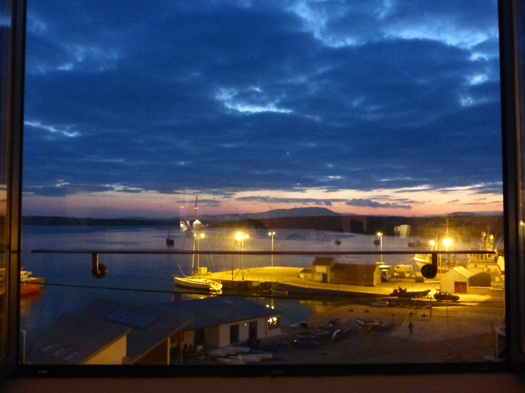
The view from Room 12 at the Waterfront in Baltimore. The sun has set beyond Mount Gabriel, but somebody is busy launching a newly-arrived RIB by floodlight, and the buzz from the square below is still rising. Photo: W M Nixon
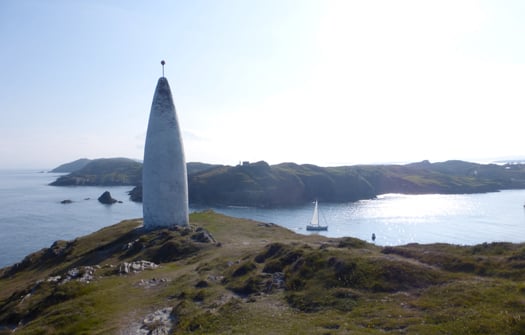
It has to be one of the best arrivals in world sailing. A cruiser enters Baltimore beneath the Baltimore Beacon, aka Lot's Wife. Photo: W M Nixon
It was fifty years ago when I first sailed in to Baltimore, coming in from the west on a round Ireland cruise, and entering port close under the beacon – Lot's Wife they call it – to find a quiet little place which showed some signs of a former prosperity, and hinted at better times to come. Back in 1964, it still had its railway station, but the West Cork Line was in its final year and was soon to be totally closed. Before that happened, later that summer when Baltimore Sailing Club hosted Dinghy Week for the Irish Dinghy Racing Association, the Firefly Class in Dun Laoghaire – mostly university boats – had been able to have a Tuesday night race. Then they'd towed their boats into Dun Laoghaire station on the launching trolleys, put them onto a CIE flat truck, and found them on Friday night safely delivered by rail the entire way to West Cork, offloaded ready at the harbourside station in Baltimore, and waiting for the arrival of thirsty crews keen for a bit of sport.
Mostly, they'd got themselves there by overloading some little car belonging to somebody or other's mother, so the fact that they disdained to use the railway themselves would help to explain why such a charming amenity was doomed. Since then, of course, Baltimore Railway Station from 1969 until recently had become Ireland's first Glenans base. But life moves on, the Glenans model doesn't seem to work any more in Ireland, so now the former station is for sale by the powers-that-be, and there are ructions being raised about it all which should keep everybody nicely exercised through the rest of the summer.
It was another French import which currently sets the pace in Baltimore. Around 1980 a young Breton fisherman, Youen Jacob, came into the harbour, and in time he settled there. To say that Youen Jacob has played a major role in Baltimore life is understating the case. It is he and his family who have developed the Waterfront – quite a challenge in somewhere as conservative as West Cork – and with Youen Jnr's Jolie Brise restaurant and guest house beside it to provide an alternative aspect of good Breton cuisine, the Jacob family's establishments have given a healthy new configuration to Baltimore's miniature harbourside square, and have settled in so well you could be forgiven for thinking the little town was built around them.
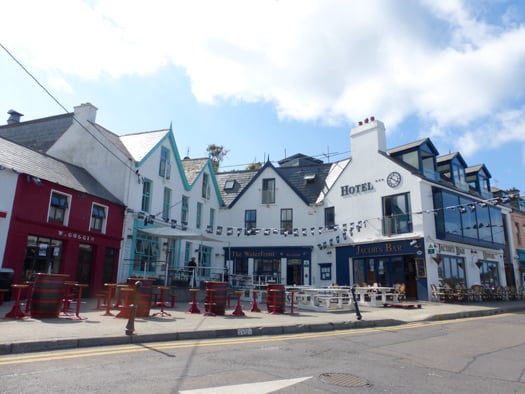
The Waterfront (right) and Jolie Brise at the south side of the mini-square in Baltimore bring a welcome breath of Brittany to West Cork. Photo: W M Nixon
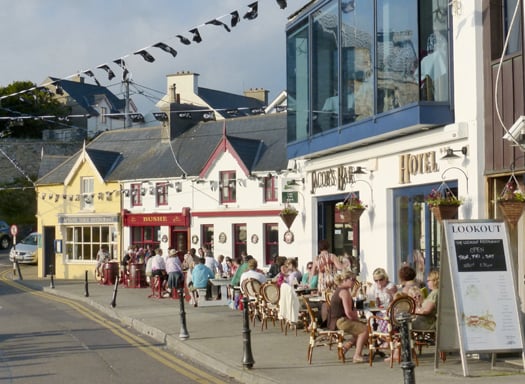
It's party time in Baltimore. The al fresco lifestyle is expected in West Cork in summer. Photo: W M Nixon
There are times when you'd understandably think this is the hub of the maritime universe, and why not? But if, during a quiet cruise, you think you might find it too hectic at night when the joint really is jumping, the sensible thing is to call by at lunchtime when everybody is out at the islands and Baltimore is refreshed and catching its breath for the next night's partying. Then in the evening, you can pop over to Sherkin Island where peace will reign while Baltimore ramps up the socializing.
Up in our eyrie above the square, we savoured the life of this busy little port. It's not quite a 24-hour town, but late at night boats were still being launched by floodlight, and conviviality continued in the square. Finally, peace descended, and though most folk were slow to stir early in the morning, the first ferries were coming in, and a workboat headed out for the islands, going past Graham Bailey's Peel Castle, the remarkable bisquine-rigged variation on a 50ft 1929-built Cornish lugger which is seen at her best on her mooring in Baltimore harbour. This is only right and proper, as the restoration and re-configuration of Peel Castle took place nearby, just up the Ilen River at one of the boatyards at Oldcourt.
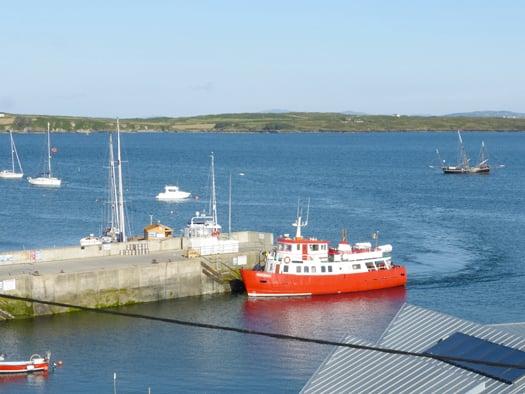
Good morning Baltimore, how are you? The first ferry arrives in from Sherkin Island. Photo: W M Nixon
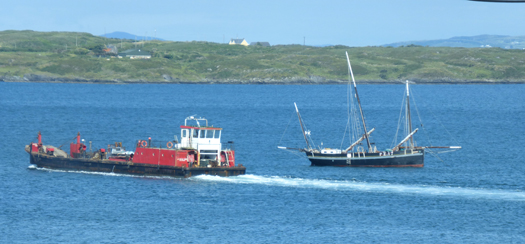
Getting the day's job started. A workboat heads out towards Sherkin past Graham Bailey's distinctive Peel Castle. Photo: W M Nixon
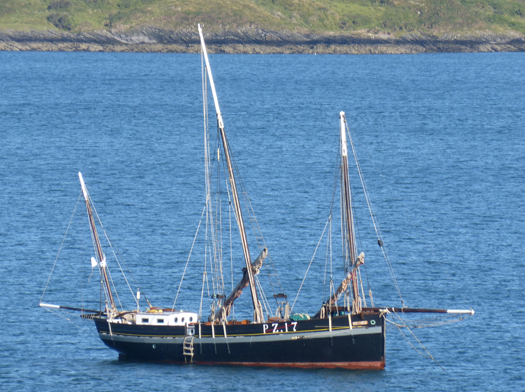
Peel Castle in all her glory in the middle of Baltimore Harbour. Restoring this 1929-built 50ft Cornish fishing boat and giving her a bisquine rig took Graham Bailey eight years of dedicated work at Oldcourt. Photo: W M Nixon
Another Baltimore revival which gets our approval is the restoration of the castle right in the middle of town, the "tigh mor" which presumably gives the place its name. We suffer from a widespread ruins overload in Ireland, so it's refreshing to find that somebody upped and took action, brining a ruin back to life and giving Baltimore a very effective signature focal point with a useful function. You could do the same to good effect at Dromineer on Lough Derg, where the ruined castle is an eyesore.
But you don't even have to leave the Baltimore area for a worthwhile restoration project, as just across the harbour beside the pier on Sherkin is the roofless ruin of the 15th Century Franciscan friary which we know looks much better with its roof back on, even if it has been missing since the 1770s.
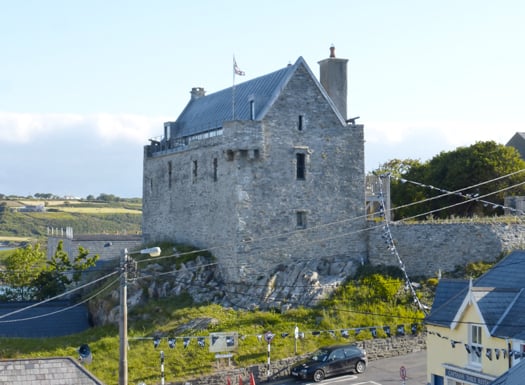
The restoration of the castle at Baltimore has given welcome and useful new life to a former ruin. Photo: W M Nixon
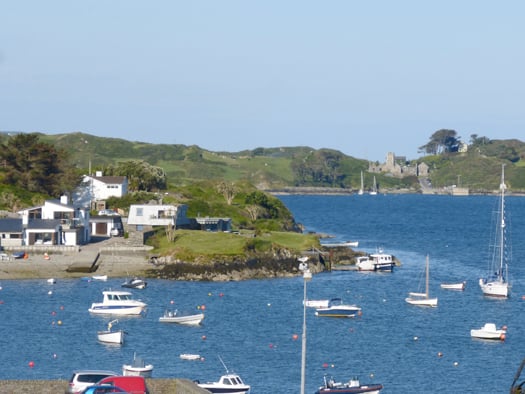
The Cove on the south side of Baltimore Harbour has some very desirable real estate. Photo: W M Nixon
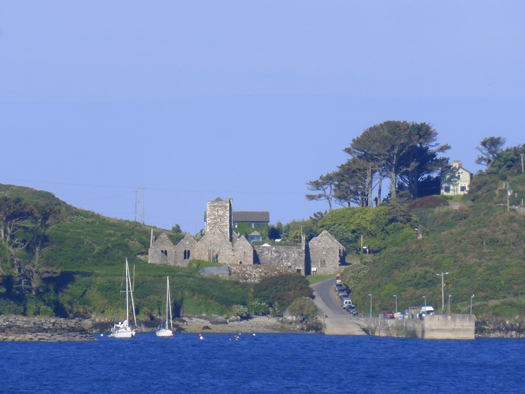
Thanks to its use as a film set in 1973, we know that the friary on Skerkin Island looks much better with it roof in place. Photo: W M Nixon
We know this because, in 1973, the makers of a TV film managed to get permission from the OPW to put a temporary but very convincing roof in place, and it looked so utterly right. The film was the unfairly forgotten Catholics, based on the novel of the same name by Belfast-born Brian Moore, and memorably starring Trevor Howard as the troubled Father Abbot. Even in this usually overlong blog, there isn't space to go into the details of the story, but it's worth viewing Catholics at the very least to see how well Sherkin friary looks with a roof. Alas, when filming was done the production company religiously (how else?) adhered to the OPW's demands to return the very attractive little old building to its ruinous state, and there it sadly sits.
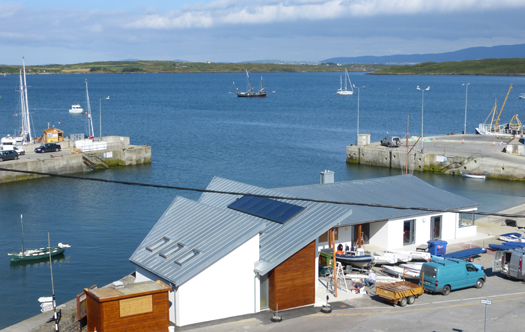
This year's work on Baltimore Sailing Club has made it even more of a local asset. Photo: W M Nixon
But as regular readers of Afloat.ie will know, other refurbishment and extension work has been under way in Baltimore, with the Sailing Club in fine fettle in its extended premises which look so well you'd think it's all new. It's certainly all of a piece with Baltimore's vitality, which contrasts with other little West Cork ports. In Baltimore, the key to it all is the fact that the Waterfront gallantly stays open all year round. But at present in Schull and Glandore, the main hotels don't even open in summer.
Doubtless in time, and sooner rather than later, both establishments will be brought back to life. But for people genuinely cruising, the absence of a hotel or two doesn't matter that much in an area where the abundance of cruising options and hospitable pubs with good food is almost bewildering. And around Baltimore in particular, there's always something going on.
The wholesome 1893-built cutter Eva (later known as Guillemot) was restored at Oldcourt, which is only a few miles from her birthplace 121 years ago on the Baltimore waterfront. Brian Marten's project to have Eva re-born and continue as Guillemot has come to a successful conclusion after she went through several vicissitudes before he happened upon her, but a visit to Oldcourt will reveal many other boat restoration, re-build and re-birth projects at various stages, including some which - as our accountancy friends would insist on putting it - are no longer going forward.
Be warned, however, that any visit to Oldcourt in any capacity whatever is likely to take longer than you expect, as there's simply so much to see. And they're at every stage, from projects just starting, through projects stalled, to projects nearing completion, while inspiration was being provided by a visiting boat, Darryl Hughes' immaculately-restored 1937 43ft Tyrrell ketch Maybird, which was berthed for a while at Oldcourt to let boatbuilder John Hegarty take off measurements in order to build a traditional clinker dinghy which will fit on board.
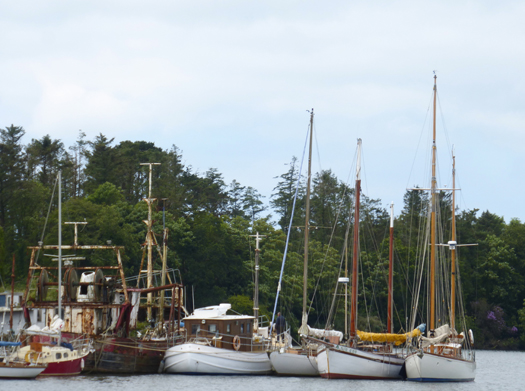
Boats in a row at Oldcourt. The further from the quay, the more ready for sea you are. Furthest out is the 1937 Tyrrell ketch Maybird, with which owner Darryl Hughes regularly attends the annual Yeats Summer School in Sligo. He's the only participant to arrive by sea, and he lives on board at the pontoon in Sligo during the Yeats festival. Photo: W M Nixon
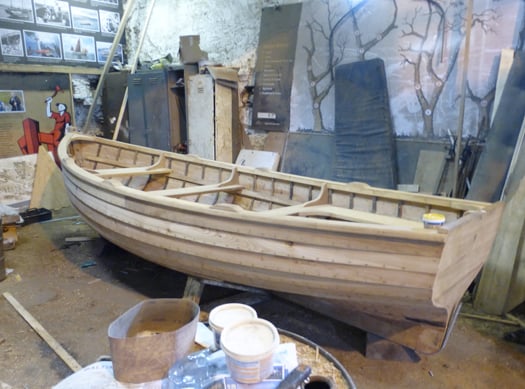
A new traditional clinker dinghy, built by John Hegarty of Oldcourt, awaits her first coast of varnish. Photo: W M Nixon
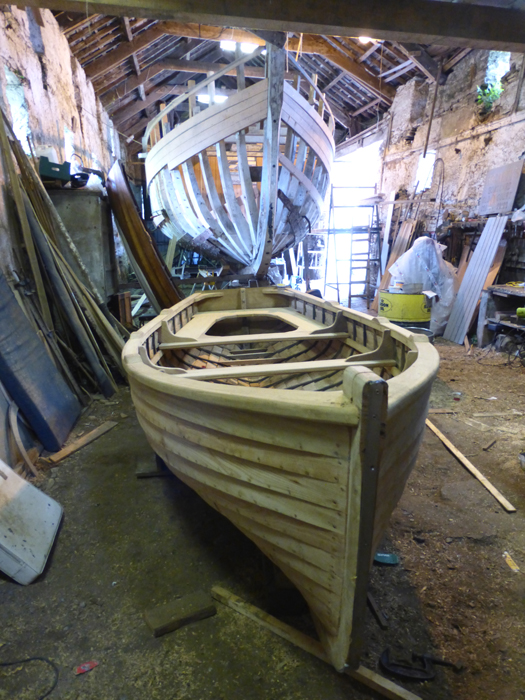
The new dinghy shares space with Conor O'Brien's Ilen, which continues to be a major work in progress. Photo: W M Nixon
Just to show what the result will be like, there was another recently-completed Hegarty dinghy in the Ilen shed, and very well it looked too. As for the restoration of Conor O'Brien's Ilen herself, that can best be described as ongoing. It has become such an absorbing task that the restoration process might best be thought of as an end in itself. Trying to work out what could most usefully be done with this hefty big lump of a boat if she ever is restored to seagoing condition is something which will require many brainstorming sessions, but it surely doesn't need to be considered in too much detail just yet.
The problem with the Ilen is she's too small for some things, and too big for others. She's of the same sort of in-between size which made the first Asgard of limited use as an official sail training vessel. Asgard was fine for teaching young people to sail, but she was simply too small to keep up with the tall ships which also completely overshadowed her in port, where Ireland's little ketch also failed to provide the necessary space and impressive setting for entertaining local bigwigs.
Manageability is the keynote to successful boat restorations. But Oldcourt is such a maritime universe that it can provide examples of what you'd think might have been eminently manageable restoration projects, yet they've ground to a halt. One such is Englyn, the creme de la crème of the boats amateur-designed by Harrison Butler, the English opthalmologist. In the 1930s, he was designing boats which successfully anticipated the highly-regarded designs of Lyle Hess more than forty years later, and the 26ft 6ins Englyn was so highly thought of by cruising guru Eric Hiscock that he included the design in his seminal book Cruising Under Sail, first published 1950.
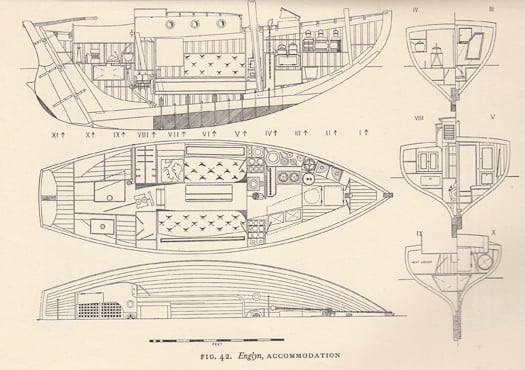
Plans of the Harrison Butler-designed Englyn, as featured in Eric Hiscock's Cruising Under Sail.
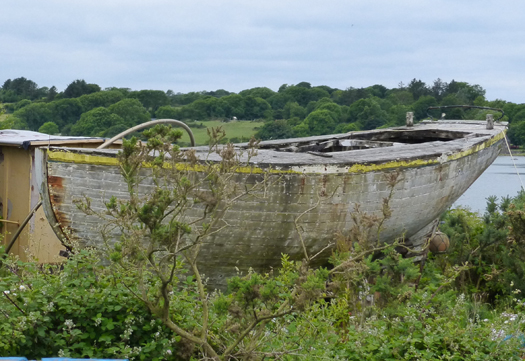
A little boat that may have missed the boat. Englyn as she is today. Photo: W M Nixon
If anything, the designs of Harrison Butler are more cherished than ever, and in this blog on May 10th we featured photos of the Harrison Butler Khamseen class cutter which ace boatbuilder Steve Morris is creating near Kilrush. It's heart-breaking to see the lines of Steve's healthy boat palely reflected in the weather-beaten remains of Englyn as she is today. But sometimes boats really can be brought back from the near-dead, and at the two-day Glandore Classic Boat Summer School in mid-July, the entire Sunday afternoon was given over to presentations about boats in various stages of restoration in and around Oldcourt.
Despite some unpleasantnesses visited upon it by the lingering death of the Celtic Tiger, Glandore gallantly soldiers on. Glandore Harbour Yacht Club's new headquarters in a cleverly rebuilt two-storey cottage up a side street (the only side street, as it happens) is appropriate to the good taste which prevails in this sweet place, whose name in Irish can mean either the golden harbour, or the harbour of the oaks - either will do very nicely.
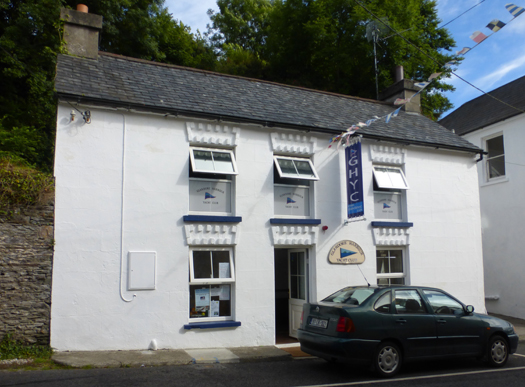
Glandore Harbour YC's clubhouse is now this cleverly re-built two-storey cottage beside the harbour. Photo: W M Nixon
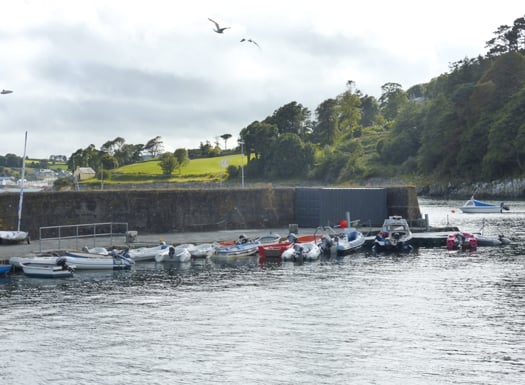
The outboard dinghies waiting at the pontoon at Glandore Pier give a good indication of the number of boats based in Glandore and across the harbour at Union Hall. Photo: W M Nixon
The Summer School packed in an extraordinary variety of topics, and even this blogger was wheeled out to develop his thesis based around the ambiguous question: Why shouldn't the Irish be a seafaring people? Don't worry, for those who missed it, we'll push it out again here some time in the depth of winter. But we cannot hope to convey the full wonder of the best event in the Summer School, the question-and-answer session between ocean voyaging and offshore racing legend Don Street and his son Richard.
The old boy hasn't half been around. And if at some time your only experience of Don Street has been a high-pitched New England rant about some iniquity of modern yachting (fibreglass dismissed as "frozen snot", for instance) it's my happy duty to assure you that, as he delved into his extraordinary memories, the pitch of Don Street's distinctive voice became deeper and more resonant, until by the time he concluded all too early, we could have been listening to Captain Ahab himself.
From such a treasure trove of recollection, there were many gems, perhaps the best being about how he came to make his profession in writing about the sea and sailing. In his early days in the Caribbean before he'd put pen to paper, on one run ashore Don and his shipmates met up with Nobel Laureate John Steinbeck, and they'd a convivial time together. Later, heading back along the islands, they'd another dinner with the great writer, and during yarning at table, Don's shipmates insisted he'd so many good stories to tell that he should write them down.
"But I don't know how to spell, and I know nothing about grammar" complained Don.
"But you've a story to tell" said Steinbeck, "and you tell it well. Just you write it down, and the editors will sort out the spelling and the punctuation and the grammar. That's their job."
God be with the days......
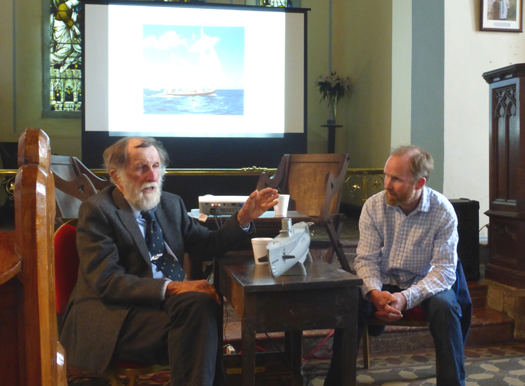
The old man of the sea – Don Street's reminiscences were the highlight of this year's Glandore Classic Boat Summer School. The school sessions were held in the harbourside church, and Don is seen here with his son Richard while he recalls his days in submarines in the US Navy. On the screen is his legendary 1905-built yawl Iolaire, in which he cruised the Caribbean and crossed the Atlantic. Photo: W M Nixon
#squib – They came from far and near to compete in the Squib South Coast Championship at glorious Glandore. Beautiful weather but light or no wind provided Principal Race Officer Nigel Kearney with challenging conditions to run the planned 3 races on the Saturday 19th July. Nigel achieved two shortened races but was forced to abandon the third race on the first beat, due to a significant fading wind shift. Patience and prayer would not suffice and all sailors were directed to the shore.
Race 1 saw Anemos, helmed by Pete Evans in first, Quickstep III helmed by Gordon Patterson second and Perfection helmed by Jill Fleming in third.
Race 2 provided a win for Lola helmed by Frank Whelan, second for Quickstep III and a third place for Anemos. Allegro improved to fourth, but posed no overall threat.
Sunday the 20th began with a light, but dying land breeze; racers wallowed around for approximately two hours for the wind gods to return to normal service. Race 4 commenced with a 10 to 15 knots of wind and sunshine – champagne sailing. From way back in the rankings, Allegro now found the groove and produced a sparkling first place finish, with Lola, and Quickstep III in close order. Effective points now were 5, 3 & 4 respectively.
In what would transpire to be the last race of the event Allegro pulled a dramatic first to Quickstep III's second, with Why Not helmed by Derek Jago, crashing the party with a third place, relegating Lola to fourth in this race.
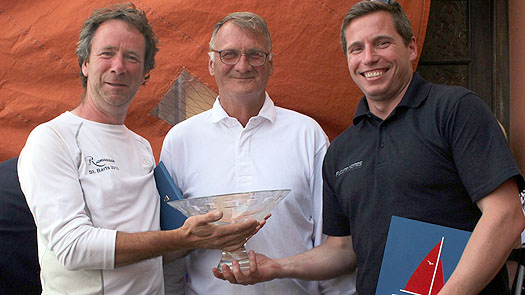
(left to right) - Colm Dunne, John Dowling Commodore, GHYC and Rob Gill. Photo: Mary Casey
Final effective points in the Gold Fleet were Allegro and Quickstep III, tied on 6 points each and Lola with 7 points, which was resolved by the scorer using appendix A8.1. The final result was first Allegro from KYC, second Quickstep III from RNYC and third Lola RSGYC.
In the Silver Fleet, John Stanley on Bateleur, KYC, took third, local hotshot Pat O'Riordan , GHYC on Blue Bottle placed second, and Colm Daly on Lazarus placed first.



























